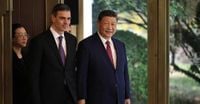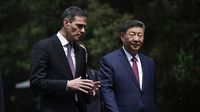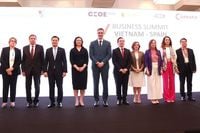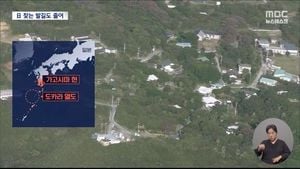On April 11, 2025, Spanish Prime Minister Pedro Sánchez made history by becoming the first European leader to visit China following a tumultuous tariff crisis. His visit comes at a time when the European Union (EU) is reassessing its trade strategies in light of recent tensions with the United States, particularly under the Trump administration.
During a press conference held at the Spanish embassy in Beijing, Chinese President Xi Jinping emphasized the need for the EU to collaborate with China to "jointly resist unilateral harassment." This statement was a clear reference to the trade war initiated by Trump, which has seen tariffs on Chinese imports soar to 145%.
Sánchez, who is on his third trip to China in just two years, met with leaders from various sectors including automotive, energy, and renewable resources. Companies like Chery, Leap Motors, CATL, and China Energy were among those represented. The Spanish Prime Minister underscored his government's commitment to attracting Chinese investments that create added value and skilled jobs in Spain.
As a result of this pivotal meeting, Spain and China signed several agreements aimed at enhancing bilateral relations. Notable among these were arrangements concerning health, the export of medicines and cosmetics, and protocols in education and film production. Additionally, agreements regarding the export of cherries and pork, crucial sectors for Spain, were also finalized. These discussions had been stalled since 2024 due to the EU's proposed tariffs on Chinese electric vehicles.
Sánchez made it clear that while he seeks to deepen relations with China, there must be a sensitivity in rebalancing these ties to ensure fairness and mutual benefit. He pointed out the significant trade surplus China holds over Spain and the EU, calling for a positive agenda that addresses shared challenges like climate change.
In a broader context, Xi's remarks to Sánchez echoed a growing sentiment in China that Western nations should prioritize multilateralism and open cooperation. He stated, "The two sides should promote the building of a fair and reasonable global governance system, maintain world peace and security, and promote common development and prosperity." These remarks came as China attempts to shore up alliances amidst escalating tensions with the U.S.
The backdrop of Sánchez's visit is complex, particularly given the recent pause on tariffs by Trump, which many analysts suggest could push the EU to increase trade with China, the world's third-largest consumer market. Xi's comments did not directly mention Trump or the tariffs but highlighted the "multiple risks and challenges" that can only be addressed through unity and collaboration.
Despite the potential for closer ties, Sánchez faced criticism from the U.S. prior to his trip. U.S. Treasury Secretary Scott Bessent condemned Spain's warming relations with China, suggesting that any country aligning closely with Beijing would be "cutting their own throat." This sentiment reflects a broader apprehension in Washington about China's growing influence.
However, Spain has taken a less confrontational stance towards China compared to other EU nations. After initially supporting EU tariffs on Chinese electric vehicles, Spain abstained from voting on the proposal, marking a shift towards a more cooperative approach. Spanish Agriculture Minister Luis Planas defended this position, stating, "Expanding the trade relations that we have with other countries, including a partner as important as China, does not go against anyone."
Spain's economic relationship with China has been growing, with the country serving as a major supplier of pork, providing about 20% of China's imports. This relationship is vital for Spain, especially as it seeks to transition towards renewable energy. In 2024, Spanish companies signed significant deals with Chinese firms like Envision and Hygreen Energy to develop green hydrogen infrastructure, further cementing this partnership.
Looking ahead, Sánchez's government is keen on balancing its trade relations with China while ensuring that Spain's interests are safeguarded. The Prime Minister's call for greater cooperation in areas of mutual interest, such as renewable energy and climate action, reflects a pragmatic approach to international relations in an increasingly polarized world.
As the global landscape continues to shift, Sánchez's visit to China may signal a new chapter in EU-China relations, one that prioritizes dialogue and collaboration over confrontation. The agreements signed during this visit could pave the way for a more balanced and mutually beneficial partnership in the years to come.






